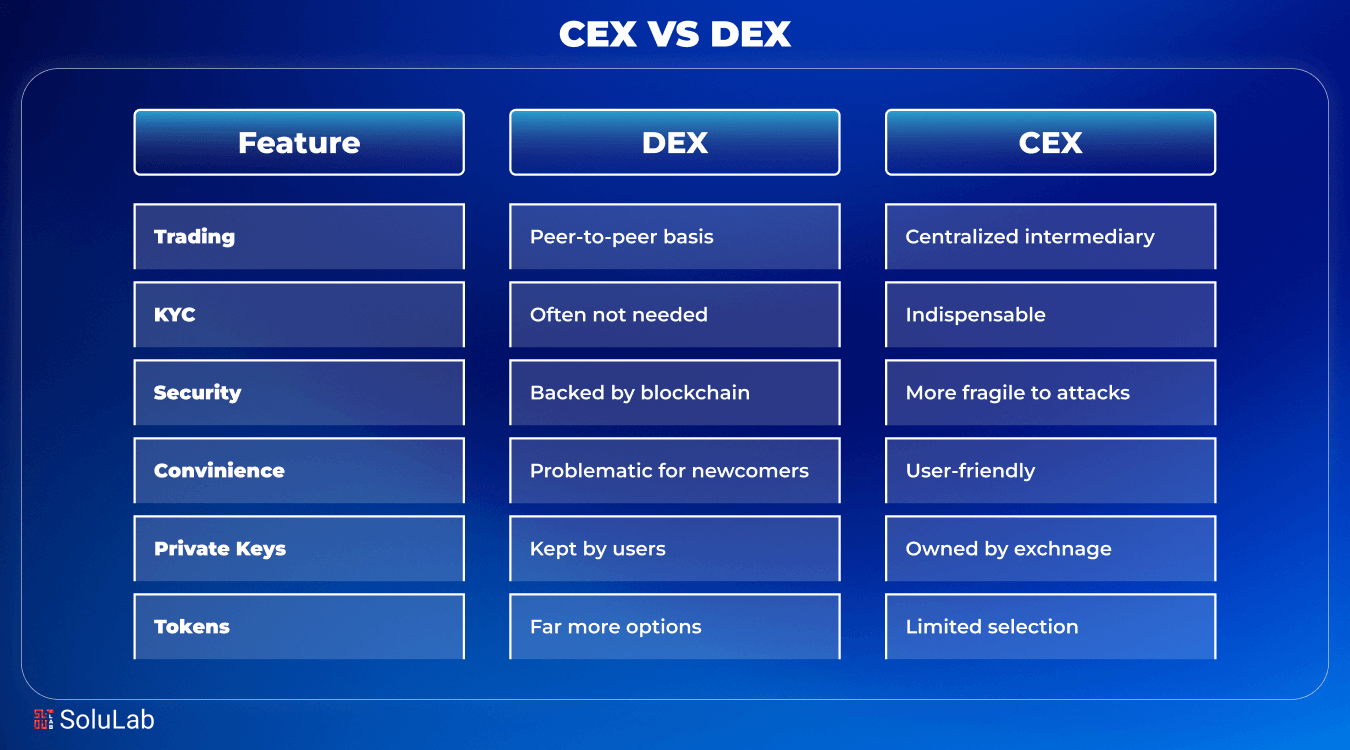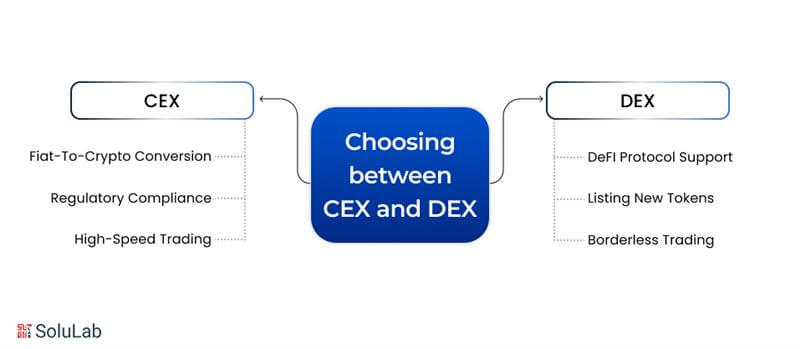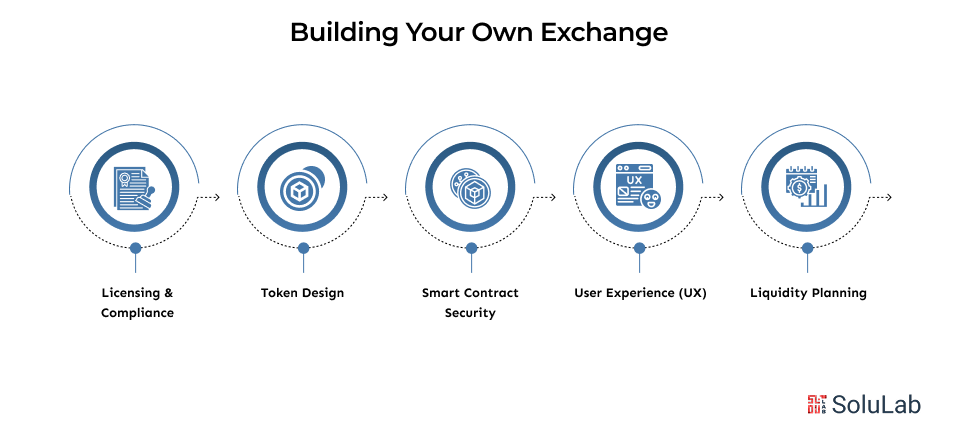
The global crypto market now serves over 560 million users, and that number is growing fast. With more institutions and enterprises exploring digital assets, one key decision stands out: should you build on a centralized exchange (CEX) or a decentralized exchange (DEX)?
Choosing between CEX vs DEX isn’t just a technical decision. It affects how you manage compliance, user experience, custody of assets, liquidity, and scalability. For businesses building crypto platforms, understanding the real-world pros and cons of each model is critical.
Whether you’re launching a DeFi project, a fintech app, or an enterprise-grade crypto solution, this guide breaks down DEX vs CEX from a business-focused angle. You’ll get clarity on features, use cases, costs, and long-term strategies.
Why Build a Centralized Exchange (CEX)?
Centralized Exchange (CEX) development gives your business full control over security, user experience, and regulatory compliance. This type of crypto exchange is ideal for enterprises looking for fast transactions, strong liquidity, and smooth onboarding for users, especially when dealing with fiat currencies.
Benefits of a CEX
- Faster transactions thanks to a well-optimized backend
- Built-in tools for KYC/AML compliance, helping you stay legally compliant worldwide
- Easier liquidity management, allowing you to offer tight spreads and competitive pricing
- Fiat on/off ramps that make it easier for users to deposit or withdraw local currencies
- Better UX control compared to Decentralized Exchanges (DEX)
Things to Consider Before Building a CEX
- Since everything is stored in one place, there’s a single point of failure, which can raise security concerns
- You’ll be responsible for handling all regulatory and licensing requirements
- It uses a custodial model, which means your users must trust your platform to store their funds securely
A CEX is often the preferred choice for enterprises that want to launch quickly, integrate with banks, or offer a wide range of crypto-fiat services. However, it’s important to have strong security and compliance frameworks in place.
What is a Decentralized Exchange (DEX)?
A Decentralized Exchange (DEX) is a type of crypto exchange that allows users to trade digital assets directly, without any middlemen like banks or centralized companies. These exchanges are built on blockchain technology and powered by smart contracts, which means trades happen automatically, securely, and transparently.
Popular examples include Uniswap, PancakeSwap, and Curve. Users can swap tokens instantly through liquidity pools, with no sign-up, approval, or central control. This makes DEXs open, fast, and permissionless.
For enterprises, launching a DEX platform means giving users complete control over their assets, enhancing privacy, and minimizing regulatory dependencies. Partnering with a reliable Decentralized Exchange development company ensures your DEX is secure, scalable, and tailored to long-term business goals.
Benefits of a DEX
- Users have full control over their assets at all times, with no need to rely on third-party custodians.
- Trades on a DEX can’t be blocked, reversed, or tampered with, making the platform censorship-resistant.
- Privacy is stronger, as KYC requirements are minimal or completely optional depending on your business model.
- Anyone with a crypto wallet can access the platform, giving you immediate global reach.
- Operational costs are lower due to reduced transaction fees and the removal of unnecessary intermediaries.
Things to Consider Before Building a CEX
- The UI/UX can be challenging for non-technical users
- Liquidity may be limited for newer tokens
- No centralized support, users are responsible for their own wallets
- Fiat integration is complex and often not supported
- Risk of smart contract bugs or attacks if not built properly
If your focus is user privacy, global access, and decentralized control, building a DEX can set your platform apart. A leading Blockchain development company helps you create a secure and scalable DEX tailored to your enterprise needs.
CEX vs DEX: A Clear Comparison for Businesses
Choosing between a CEX vs DEX is more than just a tech decision; it’s a strategic move that affects compliance, user trust, scalability, and revenue.
| Feature | Business Impact |
| Custody of Assets | CEXs hold user funds (centralized custody), while DEXs give users full control (non-custodial). |
| Liquidity | Generally higher on centralized exchanges, making them better for high-volume trading. |
| KYC & AML | CEXs fully support compliance, making them ideal for regulated industries. |
| Privacy | DEXs offer better user privacy due to fewer onboarding requirements. |
| Speed & Fees | CEXs are faster with lower latency. Some DEXs may charge higher gas fees depending on the network. |
| Development Complexity | Easier to build and manage on a CEX. Decentralized exchange development may require complex smart contracts. |
| Smart Contract Risk | Present mostly in DEXs due to their on-chain nature. Smart contract audits are critical. |
For any enterprise, the decision between centralized vs. decentralized crypto exchanges should depend on:
- Your regulatory compliance needs
- The level of control you require
- Your user base and market
- How much security and transparency matter to your brand
Check Out Our Blog Post: How to Build Your Own DEX Like Aster
What Do Users Prefer in 2025?
The market in 2025 is split but growing fast. Most of the daily crypto trading volume (over 72%) still happens on centralized exchanges (CEXs). They’re easier to use, offer higher liquidity, and are trusted in regulated markets. But decentralized exchanges (DEXs) are catching up, especially in DeFi, Web3, and privacy-focused sectors.
As per Chainalysis, DEX trading volumes rose by 23% year-over-year in 2024, and 35% of that came from institutional wallets. This shows strong demand for decentralized platforms, especially in regions where users value control and transparency.
Today, many DeFi development companies are building hybrid exchanges or cross-chain DEXs. These platforms let users enjoy decentralization while still offering the liquidity and speed of CEXs. This mix is becoming the preferred approach for enterprises and startups launching in global markets.
When Should You Choose CEX or DEX?
Choosing between a centralized or decentralized exchange depends on your business goals and target audience. Here’s a quick guide:

You should choose a CEX (Centralized Exchange) if:
- You need fiat-to-crypto conversion for users
- You operate in a regulated market and require compliance tools
- You want to support high-speed, high-volume trading
You should choose a DEX (Decentralized Exchange) if:
- You are building or launching DeFi protocols
- You want to list new or experimental tokens
- You aim for non-custodial, borderless trading
A Blockchain development company can help you evaluate these options and design the right exchange architecture for your business goals. If you are interested in building your exchange?
Can You Combine CEX and DEX?
Yes, and many businesses are doing exactly that. A hybrid crypto exchange brings together the best of both worlds: the speed and easy user experience of a Centralized Exchange (CEX) and the security and transparency of a Decentralized Exchange (DEX).
These platforms often use smart contracts to handle settlements while keeping order books centralized. This setup improves liquidity, speeds up trading, and still maintains a level of trustless execution.
Projects like Serum and Injective follow this hybrid model. If you’re planning to build a hybrid platform, it’s also possible to integrate a Crypto Trading Bot that can operate across both CEX vs DEX models to maximize trading efficiency.
What to Know Before Building Your Own Exchange

Before you build a crypto exchange, here are key things every business should consider:
- Licensing & Compliance: Make sure you meet all regulatory requirements in your target regions.
- Token Design: Define your tokenomics early; this affects how users trade and engage on your platform.
- Smart Contract Security: Always get smart contracts fully audited to avoid hacks or exploits.
- User Experience (UX): Design intuitive user flows to help users trade easily, especially on mobile.
- Liquidity Planning: Without liquidity, even the best exchanges fail. Plan how you’ll source or incentivize liquidity.
Partnering with a trusted Cryptocurrency Development Company ensures your platform is secure, compliant, and ready to scale.
Cost to Build a Centralized or Decentralized Exchange
The cost of building a crypto exchange depends on the type, Centralized (CEX) or Decentralized (DEX), and the features you need.
| Exchange Type | Estimated Cost Range | Key Cost Factors |
| Centralized Exchange (CEX) | $120,000 – $350,000 | Margin trading, KYC/AML compliance, fiat ramps, backend infrastructure |
| Decentralized Exchange (DEX) | $80,000 – $250,000 | Smart contract development, UI/UX for on-chain trading, security audits, tokenomics |
- A CEX requires more backend systems and centralized control features.
- A DEX may look simpler, but it needs strong smart contracts and liquidity mechanisms for success.
Working with an experienced white label exchange development company helps reduce risk, manage costs better, and ensure your platform is compliant and scalable from day one.
How SoluLab Helps Enterprises Build CEX and DEX Platforms?
At SoluLab, we build both Centralized Exchanges (CEX) and Decentralized Exchanges (DEX) tailored to enterprise needs.
- For CEX platforms, we deliver secure fiat integration, high-performance trading engines, and intuitive admin dashboards.
- For DEX platforms, we build with automated market makers (AMMs), liquidity pools, and DAO-based governance.
- We also support hybrid exchange models that offer the best of both worlds.
As a leading cryptocurrency exchange development company in the USA, we combine our experience in DeFi, smart contracts, and AI integration to help enterprises launch faster, scale securely, and stay future-ready.
Conclusion
There’s no one-size-fits-all answer in the CEX vs DEX crypto conversation. The best choice depends on your business goals, customer expectations, regulatory requirements, and long-term growth plans.
Whether you want full control with a Centralized Exchange, or transparency and self-custody with a Decentralized Exchange, success comes down to building the right foundation. With a trusted Decentralized Exchange development Partner, your company can confidently launch in the competitive world of Crypto Exchanges and stay ahead.
Let’s help you build it right. Contact us to get started!
FAQs
1. How does DEX vs CEX affect enterprise-level trading or investing?
For businesses, CEXs provide smoother onboarding, regulatory compliance, and deep liquidity. But DEXs offer security, transparency, and lower counterparty risk, making them ideal for DeFi-native firms.
2. What should I know about CEX vs DEX crypto platforms before building one?
CEX platforms need user KYC, support, and backend management. DEX platforms rely more on smart contracts, wallet integration, and on-chain liquidity. Your platform’s vision should guide this decision.
3. What are the top decentralized crypto exchange businesses are using in 2025?
Some of the leading DEXs include Uniswap, PancakeSwap, dYdX, and Curve. These platforms are open-source and serve as benchmarks for enterprises planning to build similar infrastructure.
4. Why are crypto exchanges important for blockchain businesses?
They form the core infrastructure of the crypto economy, enabling token liquidity, fundraising (through IEOs/IDOs), and user onboarding. A reliable exchange boosts brand trust and transaction volume.
5. Which is a better crypto exchange for startups: CEX or DEX?
It depends on your audience and market. If you’re targeting retail users and require regulatory ease, go with a CEX. If you’re DeFi-focused, looking for transparency and low-cost operations, a DEX may be better.
6. How do I choose the right Crypto Exchange development company?
Look for a team with proven experience in exchange architecture, smart contract development, security audits, and regulatory readiness. SoluLab builds both CEX and DEX platforms from scratch with custom features for enterprises.





